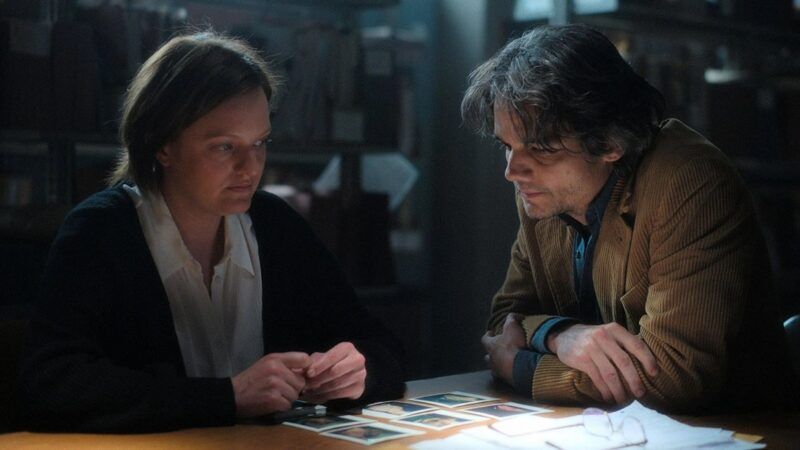Serial Killer Thriller Shining Girls Lulls You to Sleep Before Blowing Your Mind
If you can get past the first few plodding, confusing hours, entertainment awaits.

Shining Girls. Available now on Apple TV.
As a critic, I get paid to watch TV shows, which is a lucky thing for Apple TV's new series Shining Girls, because for its first two and a half hours, it's nearly unwatchable, even though it starts with a reasonably enticing premise: a couple of reporters trying to track down a serial killer. Slooooow, confusing and riddled with what-the-hell moments, it moves at the pace of a snail on Quaaludes. And then, the snail gets a shot of crystal meth. Shining Girls is an immensely entertaining show, if you have the time and patience to wait it out.
Based on a book by South African novelist Lauren Beukes (which I haven't read, but friends tell me has been altered considerably in the adaptation), Shining Girls stars Elisabeth Moss (Mad Men, The Handmaid's Tale) as Kirby Mazrachi, an editorial assistant at the Chicago Sun-Times. Her career was mostly sidelined six years earlier when she nearly died after an unseen nighttime assailant carved a cross deep into her abdomen.
Once a promising candidate for a reporting job, Mazrachi now is just a melancholy and slightly glorified clerk, wandering the newsroom to deliver clippings and photos from the newspaper's library to reporters and editors who've asked for them. (Yes, kids, there was a time—and Shining Girls is set in it—when everything in the world wasn't available at a click or two on a computer keyboard.)
But as she eyes stories written by just-short-of-washed-up crime reporter Dan Velazquez (Wagner Moura, Narcos) about the recent murder of a social worker, Mazrachi notices some similarities with her own assault. As the two team up, they uncover a string of grisly coincidences in killings stretching back years, including the killer's penchant for leaving tokens—matchbooks, key rings and the like—inside the slaughtered bodies of his victims.
What keeps this story from developing for a long time is that Mazrachi is a wildly unreliable narrator. She forgets everything from the location of her newsroom desk to which floor of the building her apartment is on. She even comes home one night to discover that a friend at work is actually her husband. Her declaration that "being married to you just doesn't seem real" is anything but metaphoric. Mazrachi is so unstuck from reality that she's furtively keeping a notebook of reminders about things as mundane as the name of her dog (or is it a cat?).
Is this a belated onset of PTSD, or just plain madness? Whatever the answer, Mazrachi's chaotic sense of her own existence—and a lesser but still troubling difficulty in communicating by her reporting partner, Velazquez, a not-necessarily-recovering alcoholic—can make it extremely difficult to follow what's going on during the early hours of Shining Girls.
The process of explication isn't helped by the determined drabness of cinematographer Robert McLachlan's look for the show, including a preoccupation with noir that's absurd even by the current nutty standards of Hollywood. The newsroom where Mazrachi and Valazquez work looks like a Boy Scout campground, with desk lamps providing tiny oases of firelight in an overwhelming gloom.
So, it isn't until midway through the third episode that Shining Girls that anything coherent can be detected as the disparate and possibly imaginary elements of the plot start assembling themselves into a whole. And only in the fourth hour do they really start to sing. But when they do, what emerges is an aria of fear that goes well beyond Shining Girls' crime-procedural surface. Evil, betrayal, and fragmentation of reality stretch in every direction. As much as I hated the first couple of hours of the show, I loved—in a creeped-out way—the rest.
Moss, who's made an entire career out of playing melancholy, emotionally shattered women, does so again in impressive fashion. But she may be outdone by Moura as her bemused colleague. He not only has his own demons but must also contend with a partner with whom he greatly empathizes but also suspects may be as nutty as a five-pound fruitcake.
And then there's Jamie Bell (Washington's Spies), who plays Harper, the spectrally talented bad guy. That's not a spoiler; he projects an air of malevolence so profound that you know he's damnably evil the first time he walks into the frame. Shining Girls is full of surprises, but when Bell is on screen, you're going to get exactly what you see, in spades.


Show Comments (11)